
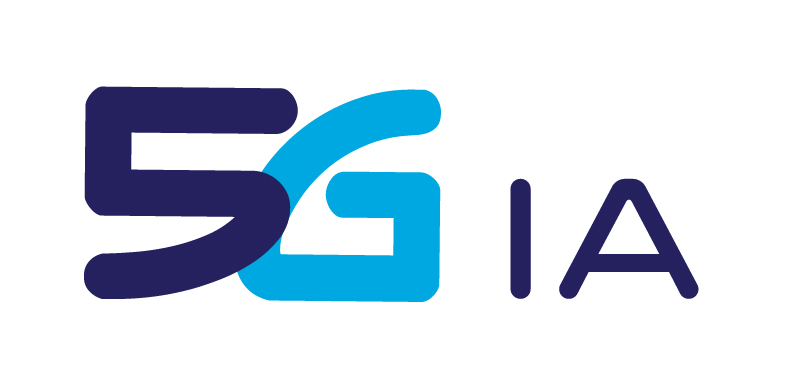
- About us
- Getting Involved
- Plans & Papers
- Events
- European 5G Activities
- Media & News
- Contact
Newsflash June 2019

Latest 5G stories
Key Take-Aways from the 7th Global 5G Event
EE
 |
Key Take-Aways from the 7th Global 5G Event |
 |

5G IA hosted the 7th edition of the Global 5G Event on 17-18 June in Valencia (Spain). The Global 5G Event is a unique series of summits organized by the world’s leading 5G organizations committed to bringing 5G technology successfully to their country or region. It has been developed in the framework of a multilateral Memorandum of Understanding in the interest of building global consensus on 5G and achieving efficiencies in the roll-out of 5G technology between 5G IA (EU), 5G Americas, 5G Forum (Korea), 5G MF (Japan), 5G Brasil and IMT-2020 (China). The 7th Global 5G Event was co-located with EuCNC 2019 – European Conference on Networks and Communications. Thanks to the great synergy between these two major events, besides the conference sessions, visitors enjoyed an exhibition area with over 75 stands with compelling state-of-the-art indoor and outdoor 5G demonstrations, including those from many 5G PPP projects. Over 550 participants from all over the world attended this edition of the Global 5G Event over the two days contributing to make it a remarkable success.
The 8th Global 5G Event will be hosted by IMT-2020 in the last week of June 2020 in Shanghai, China. “I think the 7th Global 5G Event was an amazing success. It enabled the participants to get a complete global overview of the current 5G status in terms of research, trails and deployments at one event. In addition this event clearly marked the transition from 5G in theory to 5G in practice, this being clearly shown by the multitude of outstanding live 5G demonstrations by the 5G PPP projects” stated Dr. Colin Willcock, Chairman of the Board of the 5G IA. “The 7th Global 5G Event highlighted the start of the 5G commercial ecosystem as well as the need for additional low, mid and high band licensed spectrum. The event was a great opportunity for leading 5G associations to collaborate and provide their viewpoints of the key ingredients needed for 5G commercial success” stated Chris Pearson, President of 5G Americas. “2019 is the year of 5G commercialization. The 7th Global 5G Event shows both the surprises and challenges brought by 5G, which makes us full of expectation for the future. 5G commercialization will drive the industry development and empower the digital economy. In order to realize a successful commercial 5G, IMT-2020 Promotion Group is willing to cooperate with the global industry to paint the beautiful picture of 5G together. And welcome to the 8th Global 5G Event in Shanghai, China 2020” noted Zhiqin Wang, Chairwoman of IMT-2020 (5G) PG. “The 7th Global 5G Event was an excellent opportunity to understand how the 5g networks will evolve from the present moment (where the first commercial networks are being implemented) to the moment in which all the scenarios of use will be contemplated. Experts from around the world have analyzed this evolution path and discussed the strategies for the success of 5G networks and the development necessary for the network to deliver applications across the vertical markets. A great event!” commented Jose Marcos C. Brito, General Secretary of 5G Brasil. “The 7th Global 5G Event was a complete success and great opportunity in sharing what it takes to make 5G business successful and how government-industry collaboration would come into play at the early stage of 5G for promoting 5G industry ecosystems in each region” stated DongKu Kim, Chairman of Executive Committee, 5G Forum. “The 7th Global 5G Event was very useful to discuss the perspectives of 5G Business towards 5G commercial success in each region. Especially, it was very impressive to be demonstrated the holographic remote session by Orange, Spain. We could confirm the many important issues to promote the deployment of 5G Business which are collaborating with Industries. 5GMF will continue to challenge the new issues as Loca/Praivate 5G for the development to local/rural area and the industrial utilization” stated Mr. Yoshinori Ohmura, Acting Secretary General of 5GMF.
|
||
 |
Latest 5G spectrum auctions |
 |
UE and EFTA/EEA
The German 5G auction started in March and ended in June 2019 with 6.55 billion EUR offered in total by the four bidders. Deutsche Telekom and Vodafone Germany criticized high prices of the country’s auction. Deutsche Telekom bid 2.17 billion EUR for 2×20 MHz in the 2.1GHz band and 90 MHz in the 3.6 GHz band. Vodafone paid 1.88 billion EUR. In the 2.1 GHz frequencies, it bought 2×20 MHz for 806 million EUR and in the 3.6 GHz band the company acquired 90 MHz for 1 billion EUR. Telefonica bid 1.4 billion EUR for a total spectrum of 90 MHz, including 2×10 MHz in the 2.1 GHz range for 381.1 million EUR and 70MHz in the 3.6 GHz band for 1.04 billion EUR. The newcomer 1&1 Drillisch acquired 2×10 MHz in the 2.1 GHz band and 50 MHz in the 3.6 GHz band for 1.07 billion EUR. Coverage obligations for the licence winners include a requirement to supply speeds of a minimum of 100Mbps to at least 98% of households in each state by the end of 2022, as well as all federal highways, and the major roads and railways. Furthermore, each operator will have to set up 1,000 5G base stations by the end of 2022, in addition to 500 base stations in “white spot” unserved rural areas. For newcomers, less stringent coverage requirements apply.
Norway’s was completed in a few days riasing a total of 735.057 million NOK (74.9 million EUR). Licences to use the 700 MHz band are valid for 20 years, while the 2.1 GHz assignments cover a term of 13.5 years. Telenor and Telia each bid for a 2x10MHz block of spectrum in the 700MHz band, paying 180 million NOK (18.4 million EUR) and 217.8 million NOK (22.4 million EUR) respectively. Ice got the most spectrum. It bid 337.2 million NOK (34.5 million EUR) for two 10 MHz blocks in the 700 MHz band and for two 15 MHz lots in the 2100 MHz band. All 20-year license holders in the 700 MHz band must provide mobile broadband access to 40% of population within five years. A bill reduction (40 million NOK or 4.1 million EUR) from the total bill was proposed to operators who agreed to coverage obligations. Telia subscribed to this option and secured a block with coverage obligations on “selected railway lines” for 217.8 million NOK (22.3 million EUR). Telenor also took the option and paid 180 million NOK (18.4 million EUR) to cover major including “European roads and the coastal road from Mo i Rana to Bodo”. International
China awarded four 5G licences at the beginning of June 2019 faster than earlier announced. It granted licences to the three MNOs, China Mobile, China Unicom and China Telecom and to the public broadcasting company, China Broadcasting Network. China Mobile and China Unicom said they planned to offer 5G services in more than 40 cities before the end of September 2019 for China Mobile and without being specific for China Unicom. China Broadcasting Network was issued a basic telecom licence to provide internet data transmission service and domestic telecommunication service in 2016. But the company has never launched mobile services. China Mobile, China Unicom and China Telecom had been assigned 5G trial licenses at the end of 2018.
The auction for licences on the 24 GHz band (known as Auction 102) raised 2.02 billion USD (1.791 billion EUR). Auction 101 of 28 GHz licenses concluded back in late January 2019 and raised about 700 million USD (621 million EUR). The agency said it will release a public notice for Auction 102 and also for Auction 101 providing detailed results and information for winning bidders on post-auction procedures. The FCC is already looking ahead to its upcoming December 2019 auction of spectrum in the upper 37 GHz, 39 GHz, and 47 GHz bands, which it said will be the largest spectrum auction in U.S. history.
Canada’s 600 MHz band auction started on March 12 and concluded on April 4 with a total amount of 3.47 billion CAD (2.30 billion EUR). The three national carriers were only allowed to bid on 64 of the available licenses in this year’s auction because of restrictions imposed by the Department of Innovation, Science and Economic Development (ISED). Some of the licenses were set aside for smaller carriers in order to stimulate competition and bring down consumer prices. Rogers Communications paid 1.72 billion CAN (1.14 billion EUR) for 52 licenses, followed by TELUS which paid 931 million CAD (616 million EUR) for 12 licenses. Shaw’s wireless subsidiary, Freedom Mobile invested 492 CAD million (325 million EUR) for 11 licenses, and Videotron, owned by Quebecor, won 10 licenses at a cost of 256 million CAD (169 million EUR). Absent from the list of winners was Bell, who ended up empty-handed. The company said it has sufficient low band spectrum in both urban and rural locations. 3.5 GHz spectrum is expected to be auctioned in 2020. |
||
 |
Video of 5G-MoNArch Testbed in Turin available |
 |
 During the fourth week of May, the 5G PPP European project 5G-MoNArch, in collaboration with the Municipality of Turin and Fondazione Torino Musei, demonstrated its result trough the showcase of the Touristic City testbed at Palazzo Madama in Turin. During the fourth week of May, the 5G PPP European project 5G-MoNArch, in collaboration with the Municipality of Turin and Fondazione Torino Musei, demonstrated its result trough the showcase of the Touristic City testbed at Palazzo Madama in Turin.
The objective of the Touristic City testbed was to demonstrate the benefits of the 5G functions developed by 5G-MoNArch to provide an immersive and interactive experience to the users. Such functions include: (i) network slicing, to satisfy the VR requirements needed for VR (i.e. high throughputs), (ii) Multi-access Edge Computing (MEC), to satisfy the latency requirements of haptic interactions between the users, and (iii) resource elasticity, to provide an efficient management and orchestration of the resources. The Touristic City testbed provided to a multi-user real-time virtual visit of the Madama Reale chamber, one of the most representative rooms of Palazzo Madama. The visitor, using an Oculus Rift set to control his avatar, interacted through a 5G indoor connection with a touristic guide (remotely located) that will accompany him in a virtual visit of the Madama Reale chamber as well as involve him in a restoration tutorial. The interaction among the visitor and the guide included direct voice communication and a coordinated cooperative control in the usage of the restoration tools and in moving 3D cultural artefacts. From the implementation point of view, the Touristic City testbed consisted of several hardware and software modules that have been designed to provide a flexible and scalable solution. More in detail, the testbed implemented a standard compliant 5G radio interface based on a SDR PHY/MAC and higher layers implementation. The flexibility of the solution in terms of resource elasticity was achieved through an orchestration module that took advantage of the NFV over a central and edge clouds. Based on such architecture, the visitor and the guide interacted using a VR application based on the instantiation of two slices to provide (i) the high definition 360° video stream (high throughput requirement) and (ii) the interaction/voice communication (low latency requirement). Within this implementation, the introduction of an artificial delay will trigger the appropriate orchestration functions (e.g. VNF migration from central cloud to edge cloud) to maintain the quality of the user experience. Watch the video here! |
||
 |
NetWorld Stakeholders Workshop |
 |
| The NetWorld Stakeholders Workshop was held on July 4th, 2019 in Brussels.
The next Research and Innovation programme proposed by the Commission beyond 2020, Horizon Europe, has now entered into its preparatory phase. In that context, the area of Smart Networks and Services has been identified by the Commission as a potential research area for a partnership implementation. The current ideas for such a partnership focus on the future connectivity and service infrastructure supporting the digital society and the digital transformation of our economic sectors. A value chain approach could reinforce and leverage European strongholds in connectivity and create opportunities in multiple related domains, notably the device domain, taking into account the myriad of innovative IoT devices that will be connected, and the cloud computing domain enabling big data and AI based applications. In this regard, there are also new opportunities offered by edge computing and the emerging requirement to provide services close to the user. In addition, cybersecurity emerges as a very important research issue in the context of European strategic autonomy, cutting across the various building blocks of such a device-network-service infrastructure, with blurring boundaries between these constituting elements. In terms of operational implementation, it is envisaged that this partnership will build on the successful structures of the 5G PPP with an extended scope and strategic reinforcement. |
||
Save the date!
 |
Soft City |
 |
| Toulon, France- August 28-29, 2019
Academic and industrial partners are invited to take part at the Soft City track to imagine together how to get the “hard” – technology – components to serve the “soft” part of the city – people, processes and lifestyles… The industry track will be organized around 3 half-a-day sessions – 2 panel discussions and 1 co-creation workshop. Expert panel speakers and professional facilitators will guide you through the journey. The first panel session “Envisioning a Soft Urban Future” will be articulated around questions such as:
The second panel session “Enacting the soft urban future” will discuss existing approaches, methods and tools enabling creation of future cities. Participants will be invited to share their experience and express their needs. The last session will be organised as a co-creation workshop “Co-creating Soft City services” and driven by professional facilitators. At the end of the track journey, a vision of “Soft City”, outlined methods, approaches and tools for Soft city design and defined future “soft” city services that will make use of data marketplaces and future digital infrastructures, including 5G networks will be produced. Online Registration is open here. |
||
 |
5G PPP @5GWF’19 |
 |
| Dresden, Germany- September 30-October 2, 2019
The 2019 IEEE 2nd 5G World Forum (5GWF’19) aims to bring experts from industry, academia and research to exchange their vision as well as their achieved advances towards 5G, and encourage innovative cross-domain studies, research, early deployment and large-scale pilot showcases that address the challenges of 5G. 5G-DRIVE, 5G EVE, 5G-VINNI, 5GENESIS, and SLICENET are organising the “2ndWorkshop on 5G-Trials – From 5G Experiments to Business Validation” and calling for papers. The workshop aims at providing a forum for industry and academics to disseminate new findings on 5G trials and new business development. The workshop calls for papers presenting test results from trials as well as theoretical results based on realistic deployment schemes and new 5G business models. More information here or there. Important Dates Acceptance Notification: June 30, 2019 |
||
 |
AIOTI Event “IoT Through the Looking Glass” |
 |
| Brussels, Belgium – October 8, 2019
In the morning cross-vertical challenges and opportunities in research, emerging ecosystems, and societal trends will be explored. The impact and importance of pursuing a collaborative approach and look at future topics and technologies that will affect intelligent connectivity and IoT in Horizon Europe will also be highlighted. Join the debate on cutting-edge technologies with Europe’s leading Internet of Things organization. Hear about our vision for future European IoT Network with leading IoT players in Europe. Register online here. The programme and conference website will follow shortly. Stay tuned for more news! |
||
 |
FOKUS FUSECO Forum 2019 |
 |
| Berlin, Germany- November 7-8, 2019
For further information, please visit: https://www.fokus.fraunhofer.de/ngni/events/fuseco_forum_2019. Additional details will be disclosed soon. |
||
 |
5G Techritory 2019 |
 |
| Riga, Latvia – November 27-29, 2019
5G Techritory has initiated a new open platform for cross-border, cross-level and cross-sectoral cooperation for the development of a sustainable 5G ecosystem in the Baltic Sea region in line with the European Commission’s Strategy for the Digital Single Market and the Nordic-Baltic digital cross-border cooperation policy and its 5G Action Plan for 2018-2020. The Forum has helped to facilitate establishing new partnerships between global and regional ICT companies, governments, municipalities, business support organizations, universities and other key stakeholders in the region and in the wider European context. During 3 days of intensive and comprehensive up-to-date program on November 27-29, the Forum will highlight: Additional details will be disclosed soon. |
||
 |
ICT Proposers’ Days 2019 |
 |
| Helsinki, Finland – September 19-20, 2019
The ICT Proposers Days will be held in Helsinki on September 19-20, 2019. Details will follow soon on this big ICT research and innovation event. See details here. |
||
The editor of the 5G PPP newsflash on behalf of the To-Euro-5G Project is: Carole Manero, IDATE DigiWorld, CS94167 – 34092 Montpellier cedex 5, France. The IDATE DigiWorld team is led by Frédéric Pujol. This document reflects only the views of its authors.



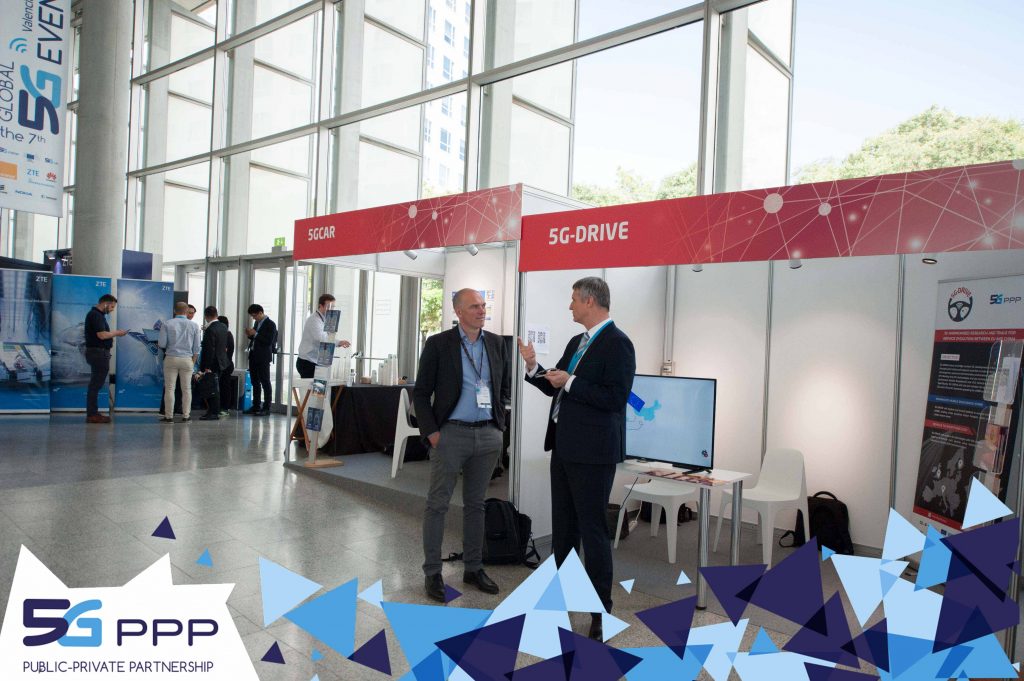
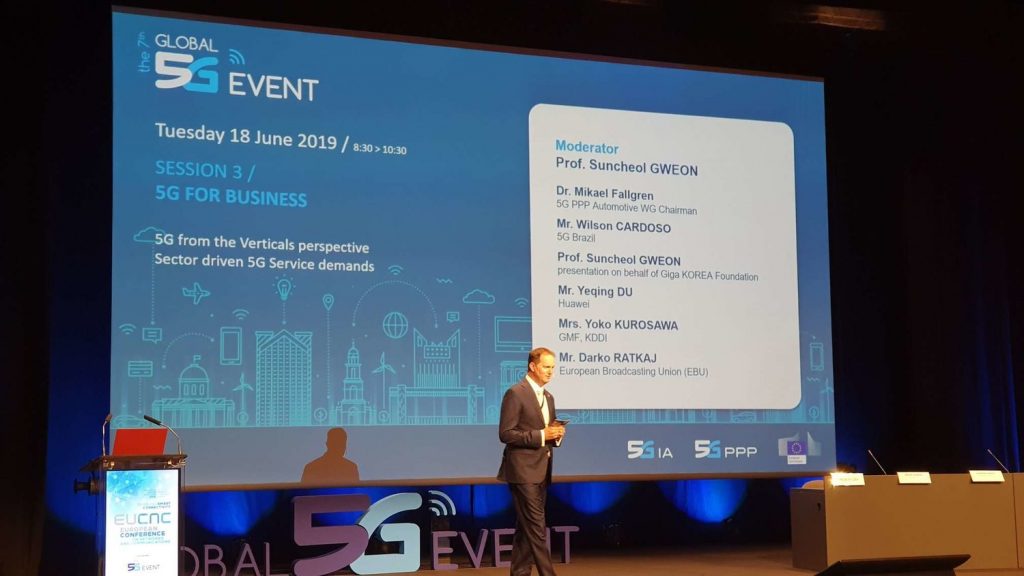
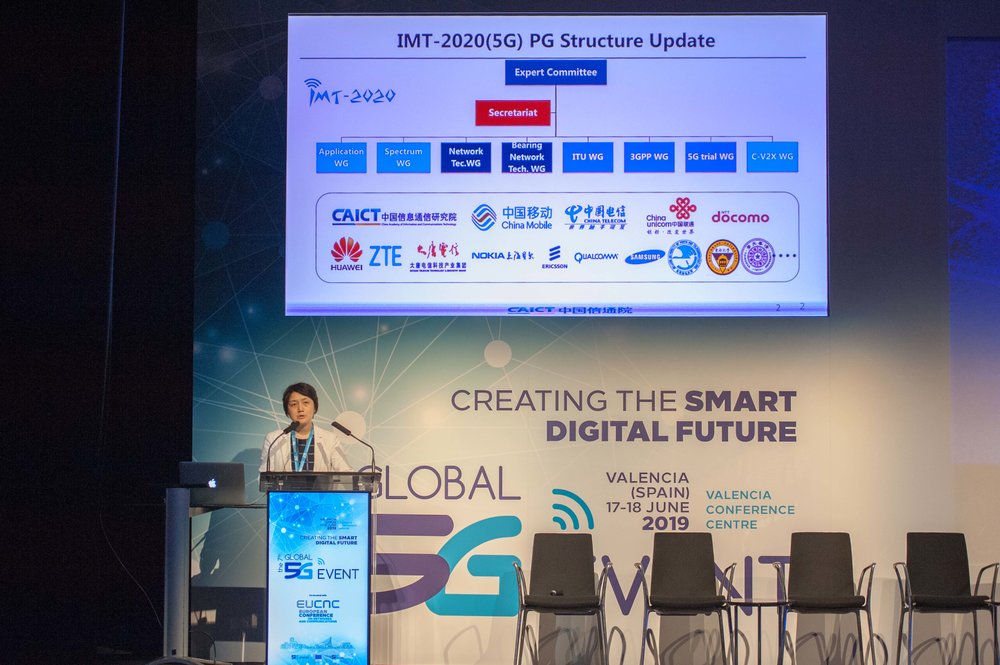 Presentations
Presentations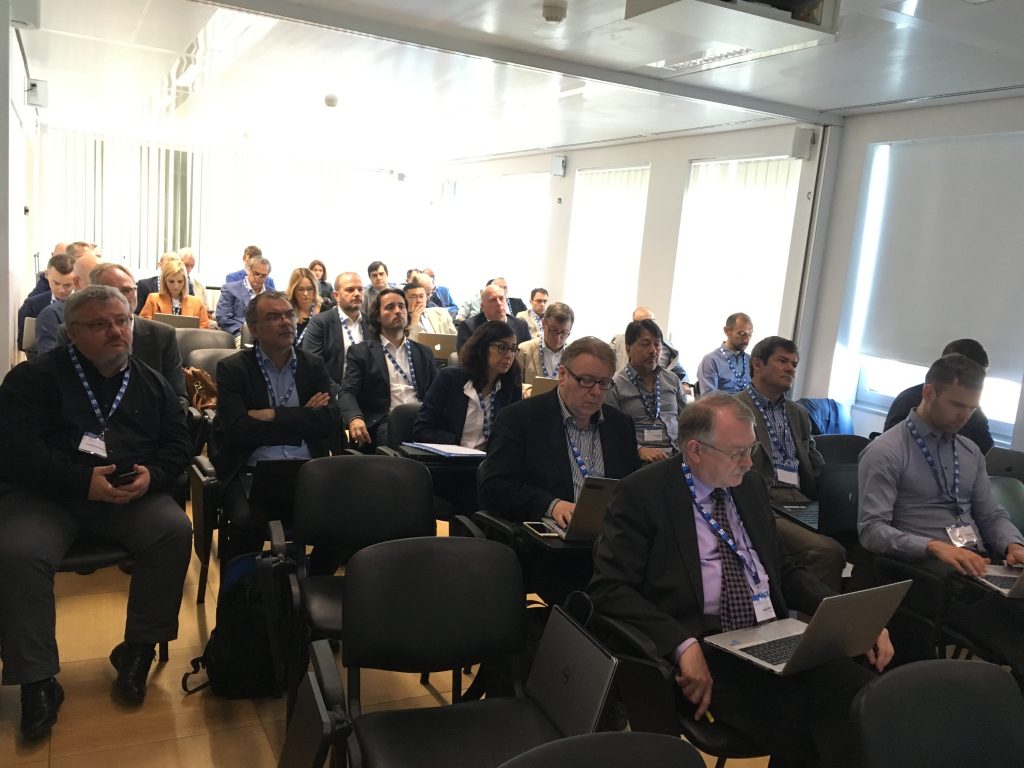
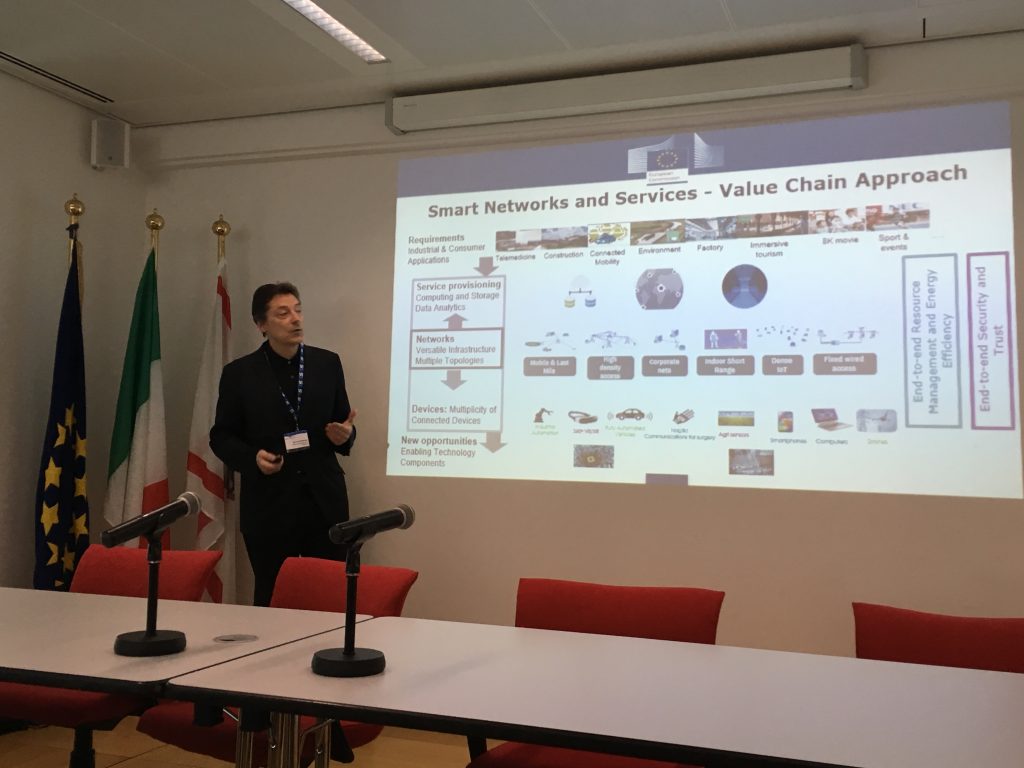

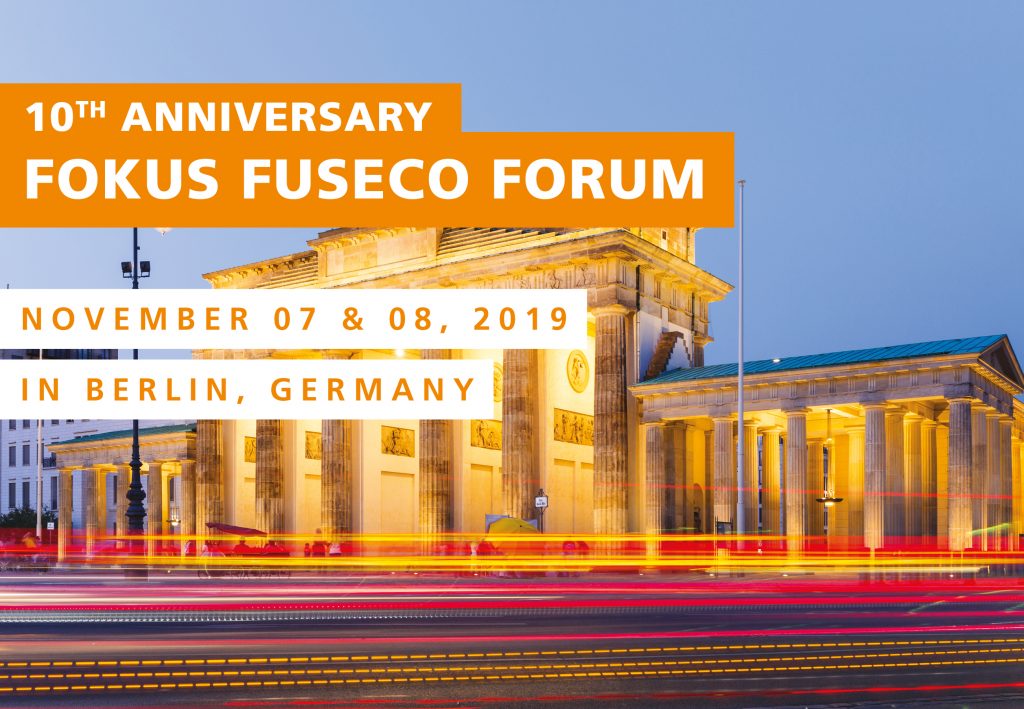 This year marks the 10th anniversary of our successful and most influential event series FOKUS FUSECO Forum with tutorials, workshops, live demos, a conference, and discussions with leading operators, manufacturers, integrators as well as various industry verticals around the most recent 5G hot topics: state of technology development in terms of standards, products and first solutions derived from international technology and application trials; potential business models in different vertical domains, particularly private networking options and operator network slicing approaches; operator 5G rollout plans, including migration and interworking with 4G, Wi-Fi and satellite networks; relevant 5G testbeds and trials around the globe.
This year marks the 10th anniversary of our successful and most influential event series FOKUS FUSECO Forum with tutorials, workshops, live demos, a conference, and discussions with leading operators, manufacturers, integrators as well as various industry verticals around the most recent 5G hot topics: state of technology development in terms of standards, products and first solutions derived from international technology and application trials; potential business models in different vertical domains, particularly private networking options and operator network slicing approaches; operator 5G rollout plans, including migration and interworking with 4G, Wi-Fi and satellite networks; relevant 5G testbeds and trials around the globe. Baltic Sea region 5G Ecosystem Forum “5G Techritory”, organized by the Electronic Communications Office of Latvia, has become a huge success already in its first year. In 2018 one of the leading 5G technology events worldwide gathered 700 participants, more than 70 senior speakers from Europe, Asia and the USA, leading industry organizations and global ICT companies as the organizational partners and main supporters. More details can be found on www.5gtechritory.com.
Baltic Sea region 5G Ecosystem Forum “5G Techritory”, organized by the Electronic Communications Office of Latvia, has become a huge success already in its first year. In 2018 one of the leading 5G technology events worldwide gathered 700 participants, more than 70 senior speakers from Europe, Asia and the USA, leading industry organizations and global ICT companies as the organizational partners and main supporters. More details can be found on www.5gtechritory.com.

